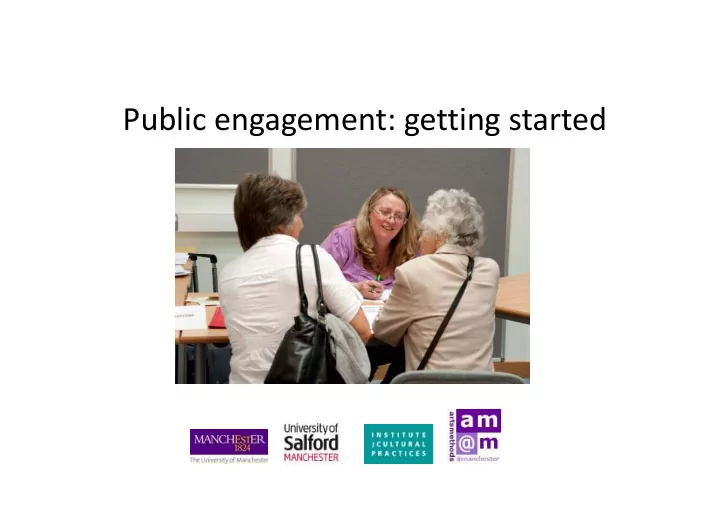

Public engagement: getting started
Introduction Afterlife of Heritage Research http://heritageafterlife.wordpress.com Project Leader: kostas.arvanitis@manchester.ac.uk Project Coordinator: emily.mcintosh@manchester.ac.uk Project Coordinator: emily.mcintosh@manchester.ac.uk
Jargon: what’s in a word? Impact? Why? How/When is it OK to use jargon?
What is public engagement?
What is public engagement? � Public engagement describes the many ways in which higher education institutions and their staff and students can connect and share their work with the public. Done well, it generates mutual benefit, with all parties learning from each other through sharing knowledge, expertise and each other through sharing knowledge, expertise and skills... � National Co-Ordinating Centre for Public Engagement, Manifesto 2010
Research Social Media Blogs & microblogging Applied Online forums & discussions Theoretical Wisdom of the crowd Collaborative Youtube lectures & demos Co-produced research Knowledge Transfer What does Info-tainment Outreach Media Public lectures Festivals public engagement public engagement Research dissemination Research dissemination National events National events look like? Learning Community Professional development Lifelong learning Student & staff volunteering Networking & sharing Cultural & social partnerships Knowledge Exchange Schools liaison Opening up spaces/facilities Influencing policy Widening participation
The Onion Source: The Wellcome Trust
Why engage the public with my research? “The question should not be is our research any good, but what is it good for?” Professor Chris Brink, VC, Newcastle University “Don't assume because you find all your work fascinating that the public will - look for your common ground.” Dr Alexis Kirke, University of Plymouth
What is reflective practice? � Schon – the process of critically refining one’s own craft or discipline through reflection. The process of considering one’s own experiences in applying knowledge to practice whilst being coached by professionals in the discipline. � The “Reflective Practitioner” – a professional characteristic as well as a process? � � Moon – reflection itself is a mental process with purpose and/or outcome. and/or outcome. � How does this apply to research? � The process of self-reflection through regular writing and review as well as discussion with PhD colleagues and supervisor(s)/academics. � Developing a vision/purpose for your work. � Can be structured or unstructured. � Reflection-on-action and reflection-in-action.
Who are your public? Their Your expectations expectations Key Issue Key Issue Their Your challenges challenges
What about your research might be interesting to the public? Jargon? Missing context? Ask for clarity Ask for the bigger picture Only getting Don’t know why the “what”? important? Ask WIIFM? Ask why should I care?
How do I design an public engagement activity?
Learning styles
Disney creative strategy
Presentations Prepare a 3 minute presentation to showcase the activity you have designed. � What worked well? � What could be improved?
Engaging skills www.vitae.ac.uk/rdf
So what next? � Identify your potential partner (if you don’t have one confirmed) � Attend second workshop on 28 February 2013 at Manchester Museum � Work with your partner on finalising your proposal � Work with your partner on finalising your proposal � Submit your revised proposal by 12 March 2013 � 6-10 revised projects will be funded with up to £400
Recommend
More recommend